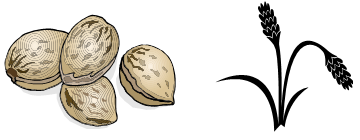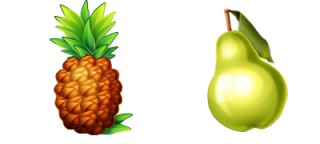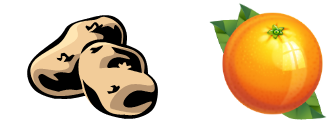The following are some of the common minerals and trace elements, together with their functions, deficiency symptoms and natural sources.
CALCIUM: Essential for all vital functions of the body including bone and teeth building and for normal growth, heart action and all muscle activity. Needed for normal clotting of the blood and many enzyme functions. Extremely important in pregnancy and lactation, also speeds all healing processes. Some deficiency symptoms are nervousness, mental depression, heart palpitations, muscle cramps and spasms, insomnia and irritability as well as the obvious ones of tooth decay and porous and fragile bones. Natural sources of calcium are milk and cheese, most raw vegetables especially dark leafy vegetables, sesame seeds, oats, almonds, walnuts, millet and sunflower seeds.
PHOSPHOROUS: This is a mineral colleague of calcium and both must be in proper balance to be effective. Important in carbohydrate metabolism. Needed for healthy nerves and efficient mental activity. Deficiencies may result in retarded growth, rickets, deficient nerve and brain function and general weakness. Whole grains, seeds and nuts, legumes, dairy products. Egg yolks, fish, dried fruits, corn and brown rice are good natural sources of phosphorous.
MAGNESIUM: A natural tranquillizer and important catalyst in many enzyme reactions especially those involved in energy production. Helps in utilization of vitamins B and E, fats, calcium and other minerals. Needed for healthy muscle tone, healthy bones and efficient synthesis of proteins, essential for heart health. Continuous deficiency causes loss of calcium and potassium from the body. Deficiency Can also lead to kidney damage and kidney stones, muscle cramps, heart attack, epileptic seizures, nervous irritability, marked depression and confusion, impaired protein metabolism and premature wrinkles. Natural sources of magnesium are nuts, raw and cooked green leafy vegetables, figs, apples, lemons, peaches, whole grains, sunflower seeds, brown rice, sesame seeds and whole barley water.

COPPER: Its functions are similar to those of iron, and iron cannot be absorbed without copper. It is involved in healing processes, in keeping the natural colour of the hair, also aids development of the bones, brain, nerves and connective tissues. Deficiencies may cause anemia, hair loss, digestive disturbances, graying of hair, heart damage. Foods rich in copper are generally those rich in iron. Almonds, beans, peas, green leafy vegetables, whole grain products, prunes, raisins, pomegranates and liver are especially good sources.
IODINE: Is essential for the formation of thyroxin – the thyroid hormone which regulates much of physical and mental activity, the rate of metabolism, energy production and body weight. Iodine helps prevent rough and wrinkled skin, and a plentiful amount of dietary iodine can help prevent poisoning by radioactive iodine 131. Iodine is essential for the health of the thyroid gland. Deficiencies can cause goitre and enlargement of the thyroid gland. Dietary lack may lead to anemia, fatigue, lethargy, slowed pulse, low blood pressure and a tendency towards obesity. A serious deficiency may result in thyroid cancer, high blood cholesterol and heart disease. The best dietary sources of iodine are kelp and other seaweed (available in tablet form). Other good sources are Swiss chard, garlic, watercress, pineapple, pears, artichokes, citrus fruits, egg yolks and seafoods and fish liver oils. (More on this next issue)

MANGANESE: An important source of several enzymes which are involved in the metabolism of carbohydrates, fats and proteins. Helps to nourish the nerves and brain, and assists in the proper co-ordinative action between brain, nerves and muscles in every part of the body. Involved in normal reproduction and the function of mammary glands so important for breast-feeding mothers. Deficiency may cause retarded growth, digestive disturbances, abnormal bone development and deformities, male and female sterility, and impotence in men, poor equilibrium, asthma and myasthenia gravis. Natural sources of manganese are green leafy vegetables, blueberries, oranges, grapefruit, apricots, bran, kelp, raw egg yolk, fresh wheat germ, whey, celery, cucumber and black figs.
ZINC: Essential for the formation of RNA and DNA and for the synthesis of body protein. Especially involved with reproductive hormone activities. Involved in carbohydrate and energy metabolism as a constituent of insulin. Essential for the normal function of the prostate gland and for bone formation. Increases the rate of healing burns. Deficiency symptoms include birth defects, enlargement of prostate gland, lowered resistance to infections, slow healing of wounds and skin diseases, white spots on finger and toe nails, poor sense of taste and smell. Lethargy, apathy, hair loss, dandruff and loss of interest in learning may occur. Epilepsy and osteoporosis are also associated with zinc deficiency. Natural sources of zinc are wheat bran and fresh wheat germ, pumpkin seeds, sunflower seeds, brewers yeast, milk, eggs, onion, oysters, herring, nuts and green leafy vegetables. Zinc “locked” in grains and seeds can be made available for assimilation by the fermentation process (as in sour bread) and by sprouting.
SILICON: Essential for building strong bones and for normal growth of hair, nails and teeth. Beneficial in all healing processes, protects body against many diseases, also holds B vitamins in the body. Symptoms of silicon deficiency are soft, brittle nails, wrinkles, thinning or loss of hair, poor bone development, insomnia, osteoporosis. Silicon can be obtained from such natural sources as young green plants, such as alfalfa, also from kelp, flaxseed, cleavers, steel-cut oats, apples, strawberries, grapes, beets, onions, peanuts, sunflower seeds, Oatstraw tea and hulls of grains.
SODIUM: Closely associated with potassium and chlorine in many vital functions in the body. The three are involved in keeping the body fluid at normal levels. Sodium is necessary for hydrochloric acid production in the stomach. Deficiencies are rare but may be caused by excessive sweating, prolonged use of diuretics or chronic diarrhea. Deficiency may cause nausea, muscular weakness, heat exhaustion, mental apathy, respiratory failure. Oversupply of sodium is a more common problem because of the overuse of dietary sodium chloride (common salt). Too much salt may lead to water retention, high blood pressure, stomach ulcers, hardening of the arteries and heart disease. Natural sources of sodium are kelp, Celery, romaine lettuce, watermelon, asparagus, sea water supplement, sea salt, whey and goats milk, carrots, cucumbers and black figs. There is more than sufficient sodium in a normal diet of natural foods without added salt.

CHLORINE: Needed for the production of hydrochloric acid in the stomach which is needed for proper protein digestion and mineral assimilation. Chlorine helps liver in its detoxifying activity and is involved in maintaining proper fluid and electrolyte balance in the system. Deficiency symptoms are impaired digestion of foods and derangement of fluid levels in the body. Seaweed (kelp), watercress, avocado, chard, tomatoes, cabbage, endive, kale, turnip, celery, cucumber, asparagus, pineapple, oats, and salt water fish are natural sources of chlorine.
SULPHUR: The beauty mineral – vital for healthy hair, skin and nails – cleansing. Deficiencies result in brittle nails and hair, skin disorders, such as eczema, rashes and blemishes. Radish, turnip, onions, celery, horseradish, string beans, watercress, kale, fish, meat, cabbage and garlic are natural sources of sulphur.
POTASSIUM: Prevents over-acidity. Essential for muscle contraction therefore important for proper heart function, especially normal heart beat. Promotes secretion of hormones. Helps kidneys in detoxification of blood. Prevents female disorders by stimulating endocrine hormone production. Involved in proper function of the nervous system. Severe deficiency can cause accumulation of salt in the tissues resulting in sodium poisoning, edema, high blood pressure, and heart failure. Prolonged deficiency causes constipation, nervous disorders, extreme fatigue, muscular weakness and low blood sugar. Natural sources are all vegetables especially green leafy vegetables, oranges, whole grains, sunflower seeds, nuts and milk, potatoes, especially the skin, and bananas are a good source. Also potassium broth.

IRON: Essential for formation of haemoglobin, also builds up the quality of the blood and increases resistance to stress and disease. Deficiency of dietary iron may cause nutritional anemia, lowered resistance to disease, general run-down feeling, headaches, pale complexion and low interest in sex. Deficiencies are common among young girls and pregnant woman. Infants get enough iron from their mothers milk for the first year of life. Good natural sources of iron are apricots, peaches, bananas, black molasses, prunes, raisins, brewers yeast, whole grain cereals, turnip greens, spinach, alfalfa, beets, sunflower seeds, walnuts, sesame seeds, whole rye, dry beans, lentils, kelp, liver, egg yolks and dates. Because a sufficient amount of gastric enzymes, particularly hydrochloric acid is needed for proper assimilation of iron, older people are often anaemic in spite of plentiful iron in the diet. Because of this, the iron-containing fruits with their own enzymes and acids are the most reliable source of dietary iron. Vitamin C also aids in the absorption of dietary and supplementary iron.
FLUORINE: Protects against infections. Can be tonic when an excess in the form of sodium fluoride is obtained from fluoridated water – can also cause mottled teeth. It is not known what the deficiency symptoms are. Natural sources are sunflower seeds, milk and cheese, carrots, garlic, beet tops, green vegetables, almonds, goats milk, raw egg yolk and cold liver oil. Also normally present in sea water and naturally hard water.
VITAMINS
VITAMIN A: Is essential before protein can be synthesized, and is required by every cell in the body. Prevents infections by keeping cell walls strong and enabling cells to secrete a mucous which contains a virus and bacteria-destroying substance called lysozyme. Important to the health of eyes and ears, normal bone development, also enamel and dentine of teeth. It is quickly destroyed by oxygen and needs Vitamin E to protect it. Infections, stress, fevers, any type of illness and from chemical fertilizers which contaminate many of our foods. Mineral oil which dissolves vitamins A, D, E and K is often slathered on babies as baby oil. Best source of vitamin A is codliver oil kept under refrigeration. Introduce it early as babies do not object to the flavour. Carrots and other yellow vegetables are good sources.
B VITAMINS: All the vitamins in the B complex are essential as part of the enzyme system of every cell in the body to help produce energy in utillising fats, carbohydrates and proteins, and preventing cholesterol clogging arteries. Valuable intestinal bacteria thriving in breast milk produce sufficient of the B’s for the breast fed infant. If brewers yeast (not bakers yeast) is added to a formula with a little yoghurt or acidophilus culture. This will make these intestinal bacteria available to the bottle-fed baby. The action of the B vitamins is synergistic – they all work together. Molasses, fresh wheat germ and brewers yeast are the best sources, followed by green leafy vegetables.
VITAMIN C: Protects from anemia, allergies and infections, and decreases the need for vitamin B by stimulating growth of the intestinal bacteria., reduces the harm done by drugs, food additives and nitrates, and it speeds the recovery from every type of illness. Abundant in many fruits and parsley.
VITAMIN D: is vitally important. When it is adequate and protein is produced in the intestine, it carries calcium to the blood, this aiding strong bone development and decay-resistant teeth. It also increases the absorption, retention and utillisation of magnesium as well as calcium and decreases the loss of both minerals in the urine and faeces. A shortage of vitamin D can lead to cancer and rickets which are rife in the U.K at present amongst immigrants adapting to a new diet and less sun. The best source is fish liver oil and sensible sunshine.
VITAMIN K: Is necessary for the clothing of blood and is produced in intestinal bacteria. Like natural vitamins A, D and E, K can only be absorbed when fat is present. Deficiencies are now increasing when skim milk formulas are being used. Oral antibiotics destroy intestinal bacteria and can produce vitamin K deficiencies which result in oozing of blood or haemorrhaging in almost any part of the body. Yoghurt and/or acidophilus should be added to a baby’s formula or food for at least three weeks after a course of such antibiotics. Alfalfa, comfrey and other greens are a good source of vitamin K.
VITAMIN E: Is probably the most neglected of the vitamins, and few paediatricians recognize vitamin E deficiencies. Vitamin E is necessary for the synthesis of DNA and RNA, and hence for the formation of all body cells, including those in the bone marrow, muscles, eye and brain. It also protects vitamin A, carotene, and the hormones of the pituitary, adrenal and sex glands from being destroyed by oxygen. When vitamin E is undersupplied, the essential unsaturated fatty acids forming part of all cell walls are destroyed by oxygen, causing cells throughout the body to break down. Blood analyses show that all newborn infants are extremely low in vitamin E. In the first days of life this can lead to an anaemia known as hemolyric anaemia. If the mother’s diet is adequate, breast milk supplies vitamin E. Colostrum, the first milk secreted is seven times richer in the vitamin than later milk, but as long as the baby is nursed the amount of vitamin E in the blood usually remains high. Even though the quantities given vary widely, paediatricians who have done research on vitamin E deficiencies recommended that a supplement be given to all bottle-fed infants. Such a supplement should also be allowed for every baby who is nursed, starting as soon as he decreases his intake of breast milk. Natural vitamin E rather than the synthetic should be used and only the stable d-alphatocpherol acetate should be given. Vitamin E supplement should be continued throughout the entire growth period of a child. Use fresh wheat germ and whole grains, unpolished rice.
In a nutshell, here are ten basic principles of the optimum nutrition as set out by world-famous nutritionist, Paavo Airola, Ph.D., N.D.
- Your optimum diet should be made up from three basic food groups which are (in order of importance): seeds, nuts and grains, vegetables, fruits.
- Eat mostly raw, living foods.
- Eat only natural foods.
- Eat only poison-free foods.
- Complement your three basic health building foods with milk (that means highest quality, uncontaminated raw milk) and remembering that goats milk is better than cows milk as a human food; cold-pressed vegetable oils; honey which is natural, raw, unheated, unfiltered and unprocessed; special protective foods such as brewers yeast, kelp, wheat germ, and fish liver oils; natural vitamin and mineral supplements.
- Avoid an excess of protein in your diet.
- Drink pure, natural water.
- Cleanse your system periodically with juice fasting
- Cultivate the following health promoting habits: eat only when really hungry; eat slowly in a relaxed unhurried atmosphere; eat several small meals during the day in preference to a few large meals; do not mix too many foods at the same meal; do not mix raw fruits and raw vegetables at the same meal; when protein-rich foods are eaten with other foods – eat the protein rich foods first; practice systematic undereating.
- Avoid the following health destroyers; tobacco, including cigars; coffee, tea, chocolate, cola drinks and soft drinks; excessive use of salt; excessive consumption of alcohol; harmful spices, mustard, black and white pepper, white vinegar; refined white sugar and white flour and everything made with them; all processed refined, canned or factory-made foods; all rancid foods; all chemical drugs except in absolute emergency; all household and environmental toxic chemicals; avoid a sedentary life and lack of sufficient exercise and relaxation.
Above all, remember that you, and your child, are what you eat.

